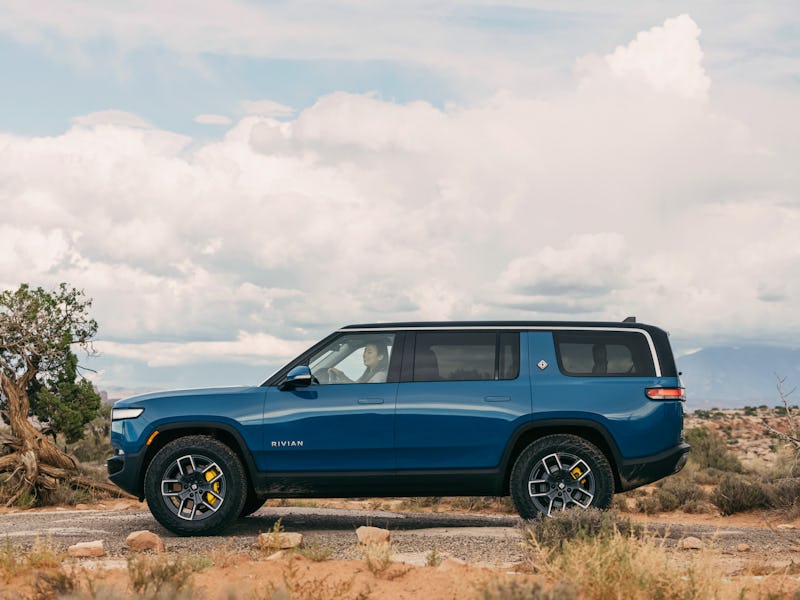Rivian: As stock soars, a new move could help it take on Tesla
Rivian could be on the move.

Amid a soaring stock price, electric vehicle maker Rivian could match Tesla’s output with a second factory in the United States.
On Monday, the Atlanta Journal-Constitution reported that the Illinois-based electric vehicle firm is in late-stage discussions to build the factory near Atlanta, Georgia. The report comes just two months after Rivian started production on its first vehicle.
Rivian is currently enjoying a surging stock price after its initial public offering on November 10. Barron’s reported Monday that Rivian’s price jumped 67 percent in its first week of trading, then jumped a further 13 percent that day. At the time of writing, the company is worth $135 billion.
It’s unclear how big the Georgia factory could be, but previous reports about Rivian’s second factory suggest a large facility. An August report from Reuters claimed the company was considering a factory on a 2,000-acre site near Fort Worth, Texas, capable of building 200,000 vehicles per year.
Reports in March claimed Rivian’s Illinois factory could reach 300,000 cars per year, but recent financial documents show it currently offers half that capacity. By comparison, Tesla produced 509,737 cars in 2020. That means, with these two factories at maximum projected production, Rivian could have the capacity to match Tesla’s current production output.
It should be noted that Tesla could close that gap soon. The company’s latest earnings report showed it has the capacity to produce 1.05 million cars per year, and it is building further factories in Berlin and Texas.
Want to find out more about Tesla’s plans to electrify transport? Subscribe to MUSK READS+ for exclusive interviews and analysis about spaceflight, electric cars, and more.
The Rivian R1T, the company’s all-electric pickup truck.
Rivian: How it plans to electrify transport
As two American car companies founded in the last 20 years, it’s easy to draw comparisons between Tesla and Rivian. But the latter firm’s CEO RJ Scaringe told Inverse in March 2019 that “Tesla’s not who we’re taking volume from.”
Instead of a Tesla-like tech focus on automation and transformation, Rivian positions itself as more for the outdoors explorer. It has announced two vehicles that fit with this:
- The R1T pickup truck, with a more conventional design than the Tesla Cybertruck. It starts at $67,500 and offers a battery range of up to 314 miles. Production started in September, and by October it had delivered 156 trucks.
- The R1S sport utility vehicle, with prices starting at $70,000 and a battery range of 316 miles. Rivian expects to start deliveries in December.
Beyond these two, Rivian also plans to start production in December on its EDV, or Electric Delivery Van. This will fulfil a deal that Amazon placed in 2019 for 100,000 Rivian commercial vehicles. Rivian expects to deliver all the vans by 2025.
The vans come in three configurations, all with a range of between 120 to 150 miles.
The Amazon EDV design.
For the rest of this year, Rivian expects to deliver around 10 EDV vans, 15 R1S SUVs, and 1,000 R1T pickup trucks.
Commenting on the reports of Rivian’s planned Texas facility in August, Tesla CEO Elon Musk warned on Twitter against jumping straight to a second factory.
“I’d recommend they get their first plant working,” Musk wrote. “It’s insanely difficult to reach volume production at affordable unit cost.”
The Inverse analysis — Musk would know about how difficult it is to reach mass production. His efforts to mass produce the Model 3 pushed Tesla into what he termed “production hell.”
But Rivian isn’t aiming for the mass market, at least not yet. At the $70,000 mark, its vehicles are notably more expensive than Tesla’s entry-level offerings.
That could change in the future. In November 2020, Scaringe hinted that the successors to the R1T and R1S “will really drive volume” in Europe and China.
Tesla’s first factory in Fremont produces all four of the company’s existing vehicles, including the later-released mass market models. Rivian may be looking at a chance to expand production for a future mass market push, even if it’s not quite ready for that sector just yet.
SUBSCRIBE TO MUSK READS+, A PREMIUM NEWSLETTER THAT COVERS THE WORLDS OF ELON MUSK, SPACEX, TESLA, AND EVERYTHING BETWEEN.